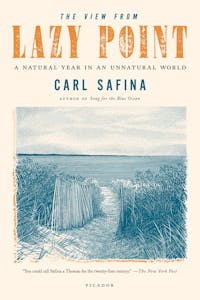The View from Lazy Point
A Natural Year in an Unnatural World
 Download image
Download image
ISBN10: 1250002710
ISBN13: 9781250002716
Trade Paperback
416 Pages
$23.99
CA$32.50
Hailed MacArthur Fellow Carl Safina takes us on a tour of the natural world in the course of a year spent divided between his home on the shore of eastern Long Island and on his travels to the four points of the compass. As he witnesses a natural year in an unnatural world he shows how the problems of the environment are linked to questions of social justice and the politics of greed, and in asking difficult questions about our finite world, his answers provide hope.
Reviews
Praise for The View from Lazy Point
"You could call Safina a Thoreau for the twenty-first century." —New York Post
"Safina's book soars . . . I had to—and wanted to—read The View from Lazy Point very slowly, allowing myself to digest its wealth of information, to revel in the beauty of Safina's writing, and to absorb fully the implications of his musings . . . What a pleasure it is to find such an enlightening, provocative companion for walking and talking—and reading. We can ask no more from those who warn about dark days ahead than that they also awaken us to the miracle of everyday life." —Dominique Browning, The New York Times Book Review
"A call to arms in the cause of hope . . . Mr. Safina's writing moves easily from revelatory observation sparked by a flash of bird or splash of fish to passionate, lyrical philosophy." —The Economist
"Before Carl Safina, environmentalists could often be heard wondering where the next Rachel Carson, Aldo Leopold, or Henry Beston might be hiding . . . The pure sensuous detail, seeing the natural world from a variety of angles, was missing in the generations after Carson and Leopold." —Newsday
Reviews from Goodreads
MEDIA
Watch
Carl Safina Explores Lazy Point
A deeply personal book with a broadly global message, The View From Lazy Point is an exhilarating journey with a distinctly coastal flavor. In this intertwined story of humanity and the natural world, Safina shows that nature and human dignity require each other.
Share This


